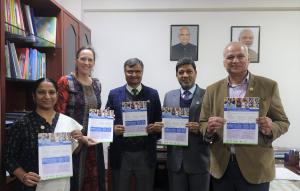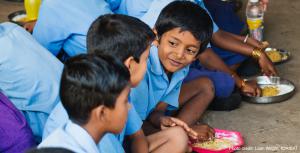First millet-meals scientific study in schools shows millets boost child growth by 50%
The findings of the study were released jointly by Prof Ramesh Chand, Member, NITI Aayog, and Dr Ashok Dalwai, Chair, Empowered Body, Doubling Farmers’ Income, Government of India, in New Delhi on Wednesday. The results were presented at the Tasting India Symposium on 18/12/2019.
“This is an example of not only a science-backed nutrition solution, but also a link between agriculture and nutrition. It is important now that we achieve mainstream consumption of millets and that they are not just for the elite,” said Prof Ramesh Chand.
Dr Ashok Dalwai emphasized, “Making it profitable for farmers to grow nutritious foods like millet has to be a key part of the Doubling Farmers’ Income vision and millets are important in the rainfed areas for farmers to cope with climate change and water scarcity.”
This Smart Food study, ‘Acceptance and impact of millet based mid-day meal on nutritional status of adolescent school going children in a peri-urban region of Karnataka state in India,’ published in the journal Nutrients, was undertaken by The Akshaya Patra Foundation and the International Crops Research Institute for the Semi-Arid Tropics (ICRISAT). Early adolescent school children in four villages—Thathaguni, Kagallipura, Allahali and Chensandra which are located around Bengaluru— participated in the study. Growth was assessed using anthropometry measurements, while sensory evaluations were made to determine acceptability.
“It is not good enough just to say we are going to add millets into the meal,” said Dr S Anitha, a nutritionist at ICRISAT and the study’s corresponding author. “The type of millet, its variety, how it is cooked and the foods it is combined with are some of the key elements that can make a difference in nutrition. For instance, the amount of iron available in a meal can be doubled by selecting the right variety of millet. This is the first known scientific study of millet based meals in a school feeding program.”
The researchers gave the study group children meals including idli, khichdi, upma and bisibella bath in which rice was replaced by pearl millet (bajra), ragi (finger millet) or little millet (kutki). The anthropometric measurements at the end of the feeding program were compared with that of control group children who consumed fortified rice with sambar.
“Akshaya Patra is always looking for ways to improve nutrition in mid-day meals. The millet meals were exceptionally successful and were really liked by the children. We appreciate the Karnataka state government’s support, and with this positive result, we now hope this will garner the support needed to make nutritious millet based meals available to our future generations,” added Ajay Kavishwar, Head of Research at The Akshaya Patra Foundation.
“This initiative also included developing guidelines on how to introduce millets into menus to maximize the nutrition benefits and likability. This is pertinent now given the renewed interest in millets,” said Ashok Jalagam, Smart Food Coordinator for Asia Pacific.
Call to policy makers
The study’s authors have called for policies that (1) Follow the lessons learnt on how to include millets into meals; (2) Create a level playing field for the pricing and availability of millets (through Minimum Support Price (MSP), Public Distribution Scheme (PDS) and feeding programs (MDMs, ICDS) that will benefit from not only including millets, but also from the approach taken to introduce them; (3) Go one step further and select millets by varieties in programs, ensuring maximum nutritional value and impact and (4) Promote millets in positive fun ways.
This is highly relevant now as millets have gained attention for their nutritional value and resilience in the face of water scarcity and climate change, making them a viable option for struggling farmers if markets can be further developed. The Government of India and various states like Karnataka and Odisha have led the cause to make millets a popular food choice. The Government of India designated 2018 as ‘National Year of Millets’ and initiated a millet mission. NITI Aayog recently announced a pilot to include millets in the Integrated Child Development Services (ICDS) and MDM schemes.
“These results and guidelines developed from the study are equally important for any scheme addressing malnutrition or general health diets–whether that of governments, NGOs or private sector processors or caterers,” noted Joanna Kane-Potaka, Executive Director of Smart Food and Assistant Director General of ICRISAT.
“ICRISAT holds the world’s largest collections of millet genetic material and works closely with Indian Institute of Millets Research and other partners to improve millets by developing varieties having higher nutrient levels as well as the more conventional traits like yield and resilience,” commented Dr Peter Carberry, Director General, ICRISAT.
About
Smart Food is a global initiative to bring foods that fulfil all criteria of being good for you, the planet and the farmer into mainstream. The key objective of Smart Food is to diversify staples with Smart Foods, starting with millets and sorghum. Given that staples often constitute 70% of a meal and typically comprise of refined carbohydrate, hence little nutrition, Smart Foods can have a big impact.
The International Crops Research Institute for the Semi-Arid-Tropics (ICRISAT) is an international non-profit organization that conducts agricultural research to bring prosperity to small holder farmers in the drylands of Asia and Africa. ICRISAT has a specialty in millets, sorghum, pigeonpea, chickpea and groundnuts. ICRISAT’s global headquartered is in Hyderabad, India, and it has offices in eight countries in Africa. It is a research center of the CGIAR (a global agriculture research partnership for a food secure future). See: www.icrisat.org
The Akshaya Patra Foundation runs the world’s largest non-profit run mid-day meal program serving wholesome food to 1.66 million children in 13,839 schools across 12 states in India. The organization strives to fight hunger and malnutrition. By implementing the Mid-Day Meal Scheme in Government schools and Government aided schools, The Akshaya Patra Foundation aims not only to tackle hunger but to also bring children to school. It is headquartered in Bengaluru, India. See: www.akshayapatra.org
Rohit Pillandi
ICRISAT
+91 99495 13812
email us here
Legal Disclaimer:
EIN Presswire provides this news content "as is" without warranty of any kind. We do not accept any responsibility or liability for the accuracy, content, images, videos, licenses, completeness, legality, or reliability of the information contained in this article. If you have any complaints or copyright issues related to this article, kindly contact the author above.



